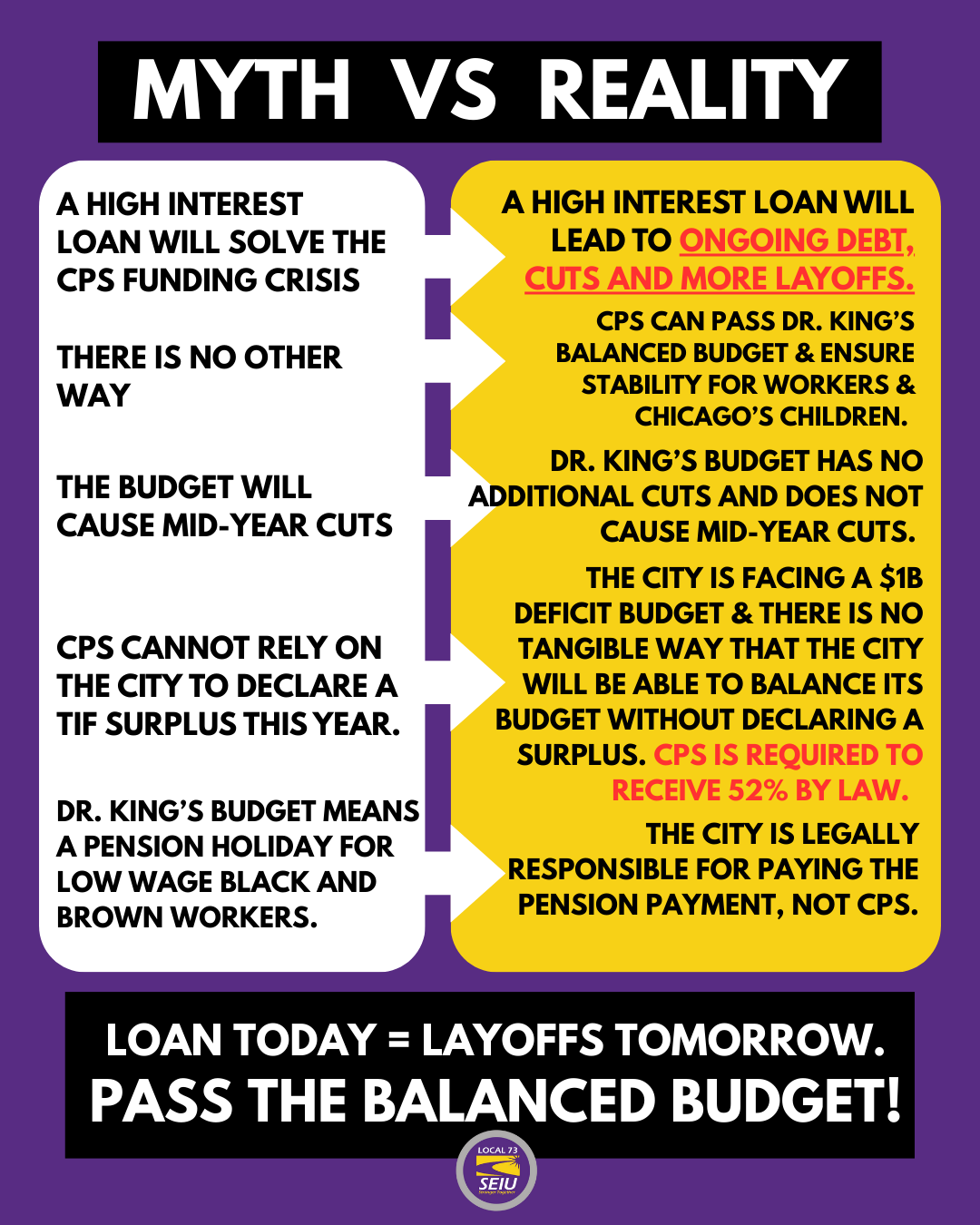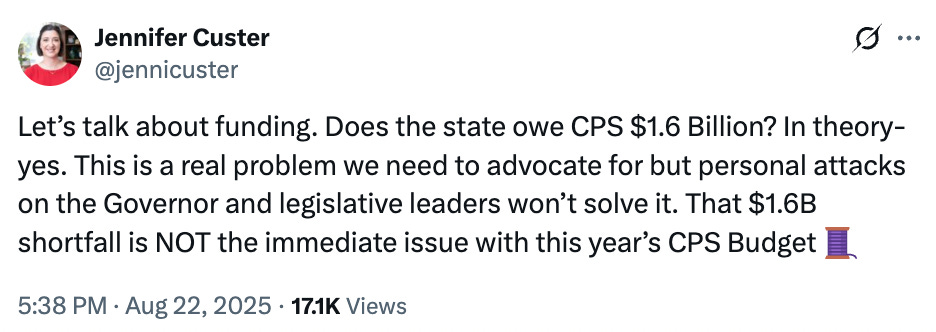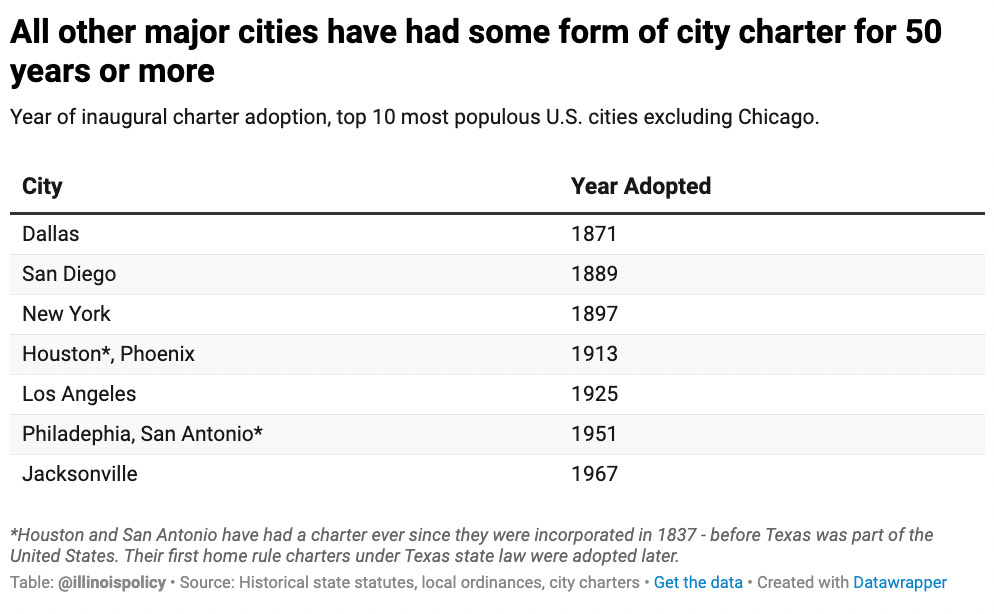Disaster unionism and the Chicago Public Schools budget vote
Mayor Brandon Johnson and his chief political backer are working to create a crisis.
This Thursday, Chicago Public Schools board members will decide whether to plunge the nation’s fourth-largest school district into a “downward spiral” toward insolvency.
Up for a vote is CPS CEO Dr. Macquline King’s budget proposal, which does not rely on issuing junk bonds and does not make a $175 million payment to the city, despite Chicago Mayor Brandon Johnson and the Chicago Teachers Union demanding both.1
The roll call is razor-thin. Most of Johnson’s appointees on the board say they want the loan. Most of the elected board members say they do not.
The budget needs 11 votes to pass, and sources indicate it will likely come down to just two or three board members currently on the bubble.
Before reading any further, contact your school board member now and tell them to vote against Johnson’s borrowing plan.
Here’s a rundown of the forces at play ahead of Thursday’s vote. And the ruinous strategy at the heart of the mayor’s demands.
SEIU comes out strongly against borrowing
One of the most important Chicago political stories of the last year is the split between SEIU Local 73 and the Chicago Teachers Union. The two were united in backing Brandon Johnson for mayor but have since fallen out, to say the least.2

“As the union representing over 13,000 CPS support staff, we urge the Chicago Board of Education to avoid $175 million in school cuts for the MEABF pension and to reject a high-interest loan with up to $194 million in interest to address the budget crisis,” said SEIU Local 73 President Dian Palmer.
“Supporters of this loan forget that last time, our members bore the cost through wage freezes and furlough days, and cuts to classrooms. Repeating this is unacceptable.”
SEIU has also been drawing attention to CTU’s previous opposition to the pension payment that they are now demanding.3 WTTW’s Brandis Friedman raised this contradiction to CTU President Stacy Davis Gates in an interview last week. But Gates dodged the question.
Disaster unionism: Gates reveals a reckless strategy
Gates made a revealing comment at the Netroots Nation conference earlier this month. And it should stick with board members deciding whether to side with the mayor on Thursday.
“You have to create the crisis by which the boss…the government can no longer ignore you,” she said.
The CTU and the mayor do not care whether additional borrowing drives the district toward insolvency. In fact, the crisis is the goal. It creates more leverage to demand more money from Springfield. Ironically, the CTU’s ruling caucus – the Caucus of Rank and File Educators, of which Gates is a member – formed in 2008 as a reading group focused on Naomi Klein’s “The Shock Doctrine,” a book which popularized the phrase “disaster capitalism.”
The book’s main argument is that bad actors take advantage of crises to push unpopular policies.
Pressuring CPS board members to approve this loan is “disaster unionism.”
Pritzker says “no”
Gates and CTU Vice President Jackson Potter ratcheted up their rhetoric against Illinois Gov. JB Pritzker last week after the governor told them there wouldn’t be extra money for CPS coming in the fall veto session.
Meanwhile, CPS Board Member Jennifer Custer pointed out that insulting the governor is not helpful to the district’s cause.

Custer went on to compare additional CPS borrowing to “setting your restaurant on fire for the insurance money-without checking whether the policy is even active.”
She’s right.
Charter chatter
Chicago is the only major city in the nation without a city charter. Last week, the Chicago Policy Center published a first-of-its kind analysis on how inaugural charter commissions were formed in other major cities, including the process for selecting members, the scope of the commission’s authority, and the method of final adoption of each city’s charter.

The bad news: We’re more than a century behind many of our peers. The good news: We can learn from their mistakes.
In the news
I joined the Mincing Rascals podcast on WGN Radio to discuss local media, the mayor’s attempted shakedown of CPS, and more.
University of Chicago Law School Prof. M. Todd Henderson wrote in the Wall Street Journal about how Chicago’s election timing suppresses the vote. Check out the Chicago Policy Center’s research on this topic here.
And if you missed the Chicago Policy Center’s screening of “Drop Dead City” at the Chicago History Museum last month, don’t worry. It’s playing Thursday, Sept. 4, at the Alamo DraftHouse in Wrigleyville. Here’s my piece in the Chicago Tribune on what Chicago can learn from the subject of the film: New York City’s brush with near-bankruptcy in 1975.

For the full background on this story, read last week’s edition of The Last Ward.
In March 2025, CTU President Stacy Davis Gates allegedly approached SEIU Illinois State Council Executive Director Anthony Driver at an event and extended her hand for a shake. When Driver reached out, she pulled her hand back and told him: “Y’all ain’t shit and you ain’t shit.” After Gates denied this accusation, SEIU Local 73 President Dian Palmer accused her of “bullying and dishonesty.”
Johnson and CTU both argued in the past that CPS shouldn’t be on the hook for the MEABF payment:
Johnson’s own transition report said CPS shouldn’t make the payment, reading, “$175M CPS pays in pension should be given back to the CPS.”
CTU opposed Lightfoot’s demand that the district make these payments, calling them “a despicable shell game” that “rips off CPS.”
CTU later called the payment “a shameful scheme to balance the city budget on the backs of CPS students.”



Totally expected when the unions elect a mayor who never could pay his own bills, and he appoints the key positions to pay back the unions. Can you imagine the average tax payer repeatedly spending more than their annual income, and just taking out loans so they can increase their over spending. Result is the average state retiree makes $25,000 a year more in retirement, than the average working tax payer. Anybody who thinks this can work, deserves the immenent insolvency which follows. Last working person to leave, turn out the lights.
Why, oh why don’t they consolidate half empty schools to save millions of dollars as a first step?